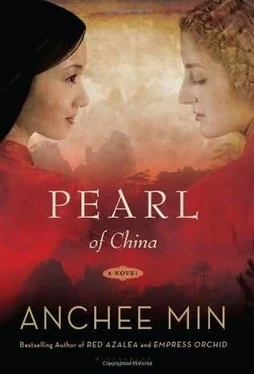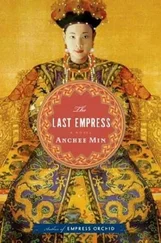“The farmers of fertile southern land are satisfied with their ways,” Pearl explained. “They are not interested in Lossing’s experiments.”
The governor of the poor province supported Lossing’s ideas because he had little to lose. The governor would gain all the benefit if Lossing succeeded. What Lossing needed was the commitment of the farmers to follow his methods. To make it all work, the governor promised to compensate the farmers if Lossing’s experiment failed.
After a few weeks, I went north and visited Pearl to see how she was faring. Her new home was a two-room cottage. It had previously been occupied by a Christian missionary family. Pearl ’s door and windows didn’t keep out the dust. No matter how hard she cleaned, within hours the inside of her house would be covered by a new layer of dust. Pearl ’s neighbors were Chinese peasant families. They lived in horrible poverty. Pearl told me that she was grateful for the roof over her head.
“Moisture seeped through my walls last month,” she said. She showed me the mold that grew underneath her bed and between her mats and sheets. “I have to always be careful when opening the chamber pot.” She tried to sound lighthearted. “I never know what could be hunting for food in there. It could be a giant spider or a grandmother stinkbug.”
The second time I visited Pearl, she shared with me the exciting news that she was pregnant. “I am finally released from my official duties for the agriculturalist.”
“The agriculturalist” was what Pearl had started to call Lossing. “I thought when I got married I would no longer have to take orders like I did from my father when I was a child.”
As a way to escape her troubles, Pearl began to write. She found comfort in writing. She told me that her imagination was the only place where she could be herself and be free. I knew she had a zest for stories. Charles Dickens was her inspiration. I remembered the first time we met that she held in her hand a black leather-bound book, which she later told me was A Tale of Two Cities. She loved Oliver Twist, Bleak House, and The Pickwick Papers. She read the stories so many times that she could practically recite them. She had always enjoyed writing and had won awards for her work when she was at Randolph-Macon Woman’s College in America. She knew that she had to keep her writing a secret. Absalom had made it clear to her that serving God was the only purpose of living. Lossing made Pearl feel guilty for pursuing anything of her own interest. He wanted her to continue to be his interpreter and was upset when she refused. Pearl joked, “Am I conditioned to a man’s dominance?”
Using pregnancy as an excuse, Pearl wrote whenever Lossing wasn’t around. She no longer complained about Lossing’s long trips that took him away for months at a time. She learned to be alone and to keep discontent locked inside herself.
Pearl confessed to me that she feared she was becoming Carie-in exile in her own home. As she made friends with the neighboring peasants, her writings began to fill with their stories.
“It’s a shame that China ’s intellectuals prefer fantasy over realism,”
Pearl wrote to me. “It’s easier to close one’s eyes on disease and death.”
I wrote back and told her that my newspaper, the Chin-kiang Independent, had finally launched. Pearl promised to contribute a monthly column. Using a Chinese man’s name, Wei Liang, she discussed politics, economics, history, literature, and women’s issues. Her articles were well received. Although the distribution was pitiful, we felt proud that we had a voice of our own.
Early in 1920, the light began to go out of Carie’s eyes. She was in and out of consciousness. Pearl rushed back from Nanhsuchou. She sensed that her mother might not live to see her grandchild.
The Chin-kiang Independent would have to close after a year. No matter how hard I pushed, the newspaper was not selling enough copies to make ends meet.
Papa offered to be the sponsor under two conditions. The name must be changed to the Christian Chin-kiang, and the contents would need to promote Christianity.
“If I spend Absalom’s money, I must sing God’s songs,” Papa insisted. “No reporting that would make Jesus lose face.”
I told Papa that I couldn’t accept his offer. In fact, my newspaper was in the middle of investigating a scandal regarding Chinese converts who continued to practice the worst of traditional Chinese customs. I had been interviewing wives whose Christian husbands kept purchasing new concubines.
Papa was upset because he, too, was having affairs with different local ladies, which he kept a secret from Absalom. Papa asked, “Why do you have to pick the teapot that isn’t boiling?”
“My readers are entitled to the truth,” I replied.
“No money from the church then.”
“So be it.”
I took the matter to Pearl, whose care of her mother was doing wonders. She was confident that the newspaper could survive. We discussed strategy and made adjustments to target the young intellectuals.
Pearl took another male-sounding pen name, Er-ping, meaning “An Alternative View.” She began to write about China ’s place in the world. She introduced Western history, the industrial revolution, different models of government, the concept of political democracy, and the world’s important schools of philosophy and art.
Pearl ’s analysis and essays generated great interest. Her eloquent Chinese impressed the readers so much that no one suspected that Er-ping was a Caucasian and a woman. The number of subscribers increased. My advertising space was sold without a struggle.
My own writings improved because Pearl edited my drafts. I practically lived in the printing factory, which was located near the town’s border. From my window, I watched the construction of the future Chin-kiang Christian Hospital, a two-story brick building funded by Absalom’s church.
Although Pearl was eight months pregnant, she didn’t get much rest. Besides helping me with the newspaper, she had to play the role of a peacemaker between her parents. The conflict between Carie and Absalom intensified. Carie could no longer stand Absalom. She forbade Absalom from ever visiting her.
“You go and save your heathens” were her last words to him.
Pearl spent nights at her mother’s bedside, sitting in a rattan chair. I would come and relieve her at dawn for a few hours. On some nights, after the day’s newspaper was out, Pearl and I would take walks, as we had when we were younger. Carie would be sound asleep as we ventured into the moonlight.
We discussed everything from China to America, from my former husband and mother-in-law to her troubled marriage.
“How is your agriculturalist?” I asked.
“Well, he is turning into a disillusionist,” Pearl replied. “Lossing resents the attitudes of Chinese farmers. He feels less sympathy toward their misery because they are closed to his ideas. His efforts didn’t succeed and the farmers quit his experiments.”
“Were you surprised?” I asked.
“No, and I don’t blame the peasants,” she replied frankly. “They have good reason to see Lossing as a foolish man. Chinese peasants know what their land is capable of producing and how to do it. Lossing believes that if his method works in Iowa, it must work in Anhui.”
“What about the government’s offer of compensation?” I asked.
“The peasants no longer want to practice Lossing’s methods even with compensation.”
“So what is Lossing going to do?”
“He has been looking for a way out. Two weeks ago he received an invitation from his former professor, who is now the dean at the College of Agriculture and Forestry at Nanking University. The dean offered a teaching position and Lossing accepted it. To hell with the farmers in Nanhsuchou.”
Читать дальше












